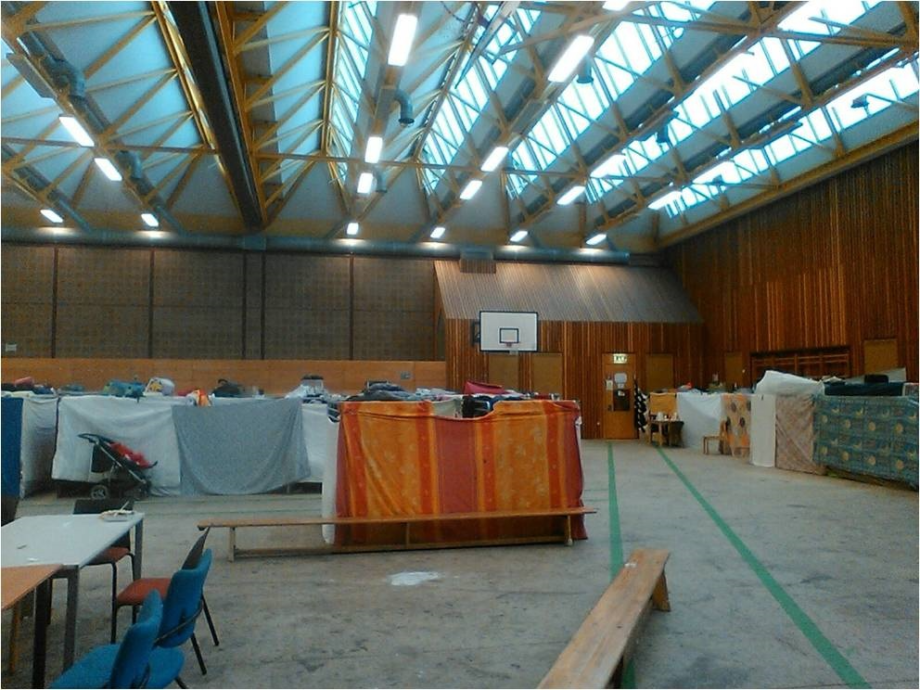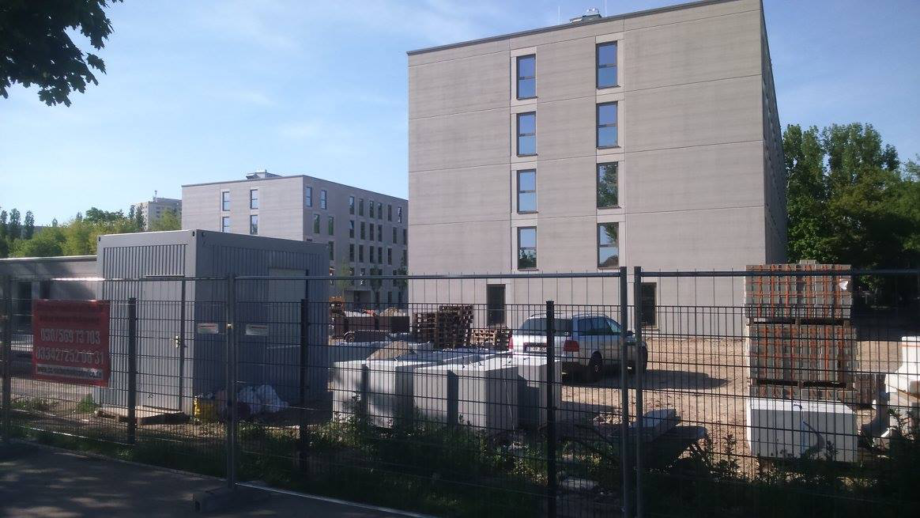Political Activism with Asylum Seekers in times of Pandemic
First of all, it needs to be said that my research is in its preliminary stages. Therefore, my contribution to this blog cannot grasp the whole complexity of ethnographic fieldwork in the times of the new coronavirus pandemic. In what follows, I first give some information about the status quo of my postdoctoral research project-in-the-making. Then I show how this project is related to my doctoral research, discussing what it means to be an activist researcher at a time when personal contacts with our collaborators can be dangerous due to the risk of infecting them.
I am currently applying for a post-doc research project within the framework of the DFG Walter Benjamin program. The project is envisaged to be an ethnography of everyday lives of Africans in Germany who mainly arrived as asylum seekers and work in the logistics sector, doing jobs such as arranging goods in warehouses or ports/airports, distributing packages for delivery companies, and doing gig jobs through platform companies such as food delivery, cleaning services, offering transportation, etc. At the same time, I wish to examine how their daily lives are also increasingly shaped by what I call „logistical control“ as a consequence of living in standardized refugee facilities such as modular and container houses. Last but not least, I aim to look at practices that represent a form of „counter-logistics“ (Mezzadra and Neilson 2019), by which my research collaborators seek to resist the control imposed on them by the state and in their workplaces. Here I will pay attention to the way they attempt to organize their lives independently from logistical control, by participating in various activities organized by their cultural and social associations, or by organizing strikes at work.
The connection I draw between this post-doc project and my doctoral research, which I conducted between 2015 and 2019, is that both fall in the category of an activist engaged research. For my PhD I focused on the challenges left-wing autonomist activists faced when working with asylum seekers during the European “refugee crisis” of 2015/2016 in Berlin, Germany, and Ljubljana, Slovenia. In particular, I examined how local political activists of the Slovenian-based initiative “Anti-Racist Front without Borders” and the German-based initiative “Lager Mobilisation Network” interacted with asylum seekers when they were trying to mobilize them for anti-border, anti-racist, and anti-capitalist political activism. I actively joined their political actions, which mainly took place in emergency shelters in Berlin and at the Slovenian-Croatian border checkpoints. Moreover, I helped organize meetings and social events that we held together with asylum seekers in rented offices or squatted buildings. In this way, I studied and analyzed the solidarities that were building up between us (the European activists) and asylum seekers in order to contest the border and migration regimes, as well as inequalities that sometimes resulted in conflicts or inability to organize political actions.
In short, I took the position of activist-researcher. Activist research is generally an ethical position a researcher takes to show her commitment to the political struggle of her research collaborators (Scheper-Hughes 1995). Taking seriously the grievances and pleas for justice of the marginalized is a necessary component of such research. However, building solidarity and caring relationships can also create power relations, in which activist-researchers hold the power to decide how and when to work with the less privileged. Moreover, while activist research work benefits careers of researchers, the conditions of marginalized do not necessary improve. These things should prompt the researcher to reflect her position towards the people she studies and works with (Madison 2005).
As I came to learn when doing this research, it is sometimes better to speak about multiple commitments, especially if we are collaborating with more than one group of people working towards social change. Political actors do not necessary share the same worldviews, interests, and motivations when mobilizing political actions. The vision of the borderless world and anti-capitalist, anti-racist, anti-sexist, etc. attitudes of the European activists as the core values that drove their—or better, our—political activism were not equally shared by all asylum seekers staying in the refugee facilities. Moreover, the ways in which the activist initiatives represented asylum seekers, calling them “freedom fighters”, did not correspond to the social roles asylum seekers wanted to play in their new social environment. As H. Cabot (2016) has pointed out, while rhetorical figures are often important in raising public awareness and as a strategy for putting various political agendas on the radar, they can silence the complexity of daily life and the needs of the marginalized.

Image 1: Emergency shelter in Berlin, 13, 5. 2016. Photo by: Ziga Podgornik Jakil.
The asylum seekers I met mainly lived in emergency shelters in Berlin. Although many of them participated for some time in the assemblies organized by activists of the “Lager Mobilisation Network” and me to talk about their everyday challenges, only a few were interested in ambitious political activism. They were searching for ways to build up social contacts with locals and ask for help with their asylum cases. They organized pickets when the conditions in their shelters became unbearable, and local activists often showed support for them by lending loudspeakers. However, the demands of asylum seekers were usually much more of a pragmatic nature, such as moving to a better accommodation and getting access to basic social services, than aimed at radical social change (Podgornik Jakil forthcoming).

Image Image 2: Modular accommodation for asylum seekers in Berlin, 13, 7. 2017. Photo by: Ziga Podgornik Jakil.
The recent coronavirus pandemic has brought numerous challenges for both activists and researchers working with asylum seekers who are staying in collective refugee facilities. Since, in Berlin, these facilities are located in densely populated container villages or modular houses and are surrounded by a fence, not only are hygienic standards difficult to apply and maintain, but every recorded infection also means quarantine for the whole camp. Going there could risk spreading the virus to other residents, many of who told me that they already feel like living in a prison. This is why I and other activists stopped visiting refugee camps when the existence of the pandemic was made known in March 2020 and remained in contact with a number of asylum seekers only through the Whatsapp application. Already during the “refugee crisis” in Berlin, using messaging apps to build chat groups proved a useful way to circulate information about what was going on inside the emergency shelters—e.g. we were able to get instant information and photos of the human rights violations in the refugee shelters, bypassing the control of the shelter administration, which often did not allow activists to enter the shelters. More recently, we have organized a Language Café in the vicinity of a refugee container camp, where asylum seekers can individually join our sessions to learn German and share their daily stories. However, in light of the recent increase in infection rates, we are considering abandoning this option and maintaining contact with residents only through Whatsapp.
It remains to be seen how the recent pandemic will affect my fieldwork with Africans working in the logistics sector. Before the new coronavirus pandemic, I met regularly with a friend from Eritrea, who has been living in a refugee camp since his arrival in Berlin in 2016. He and a many of his friends, all Eritreans, are employed in different warehouses all over Berlin and in surrounding areas. As I met several other people from African countries working in places such as Amazon and Hermes, this made me curious about why there are so many Africans employed in logistics, making this a central question of my planned research project. Besides the exploitative nature of work in large warehouses, it has been reported that more and more manual workers contracted the coronavirus when working for logistics giants such as Amazon. This may present further ethnographic challenges, especially if I decide to take a temporary job in a warehouse for my fieldwork. However, as has been recently claimed (Higgins, Martin & Vesperi 2020), the pandemic may also provide an opportunity to experiment with new methodological and epistemic approaches. Restricted access to warehouses and other physical locations should not necessarily be viewed as an impediment, as I can shift the focus from the traditional logistics jobs towards more unconventional ones that have more to do with digital and information technologies. It will also give me the opportunity to explore how refugee facilities are transformed in times of pandemics and how this shapes the way logistical control administers daily lives of African migrants living in them.
Written on 2 October 2020.
Ziga Podgornik Jakil received his PhD from the Institute of Social and Cultural Anthropology at the Freie Universität Berlin. His research work has mainly focused on migration, border regimes, social movements, and protest cultures. Contact: zigajakil[at]gmail.com
References
Cabot, Heath. 2016. “Refugee Voices”: Tragedy, Ghosts, and the Anthropology of Not Knowing. In: Journal of Contemporary Ethnography, 1-28. [10.1177/0891241615625567]
Madison, Soyini D. 2005. Critical Ethnography: Method, Ethics, and Performance. California: SAGE Publications, Inc.
Mezzadra, Sandro & Brett Neilson. 2019. The Politics of Operations: Excavating Contemporary Capitalism. Durham, NC: Duke University Press.
Podgornik Jakil, Ziga. Forthcoming. Clashing Perceptions of Justice: A Comparative Study of the Humanitarian Response, Political Activism, and Asylum Seekers’ Struggles in Berlin. In: Anthropological Notebooks Special Issue: The Cultural Anthropology of Protest against the Perceived Injustice.
Rylan Higgins, Emily Martin & Maria D. Vesperi. 2020. An Anthropology of the COVID-19 Pandemic. Anthropology Now 12 (1), 2-6. [10.1080/19428200.2020.1760627]
Scheper-Hughes, Nancy. 1995. The Primacy of the Ethical: Propositions for a Militant Anthropology. In: Current Anthropology 36 (3), 409-440.































